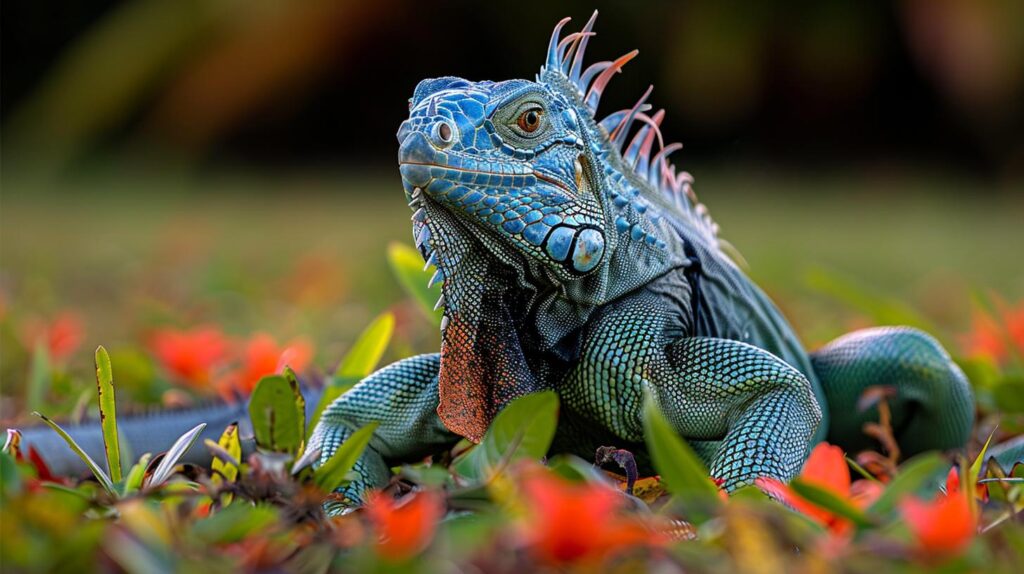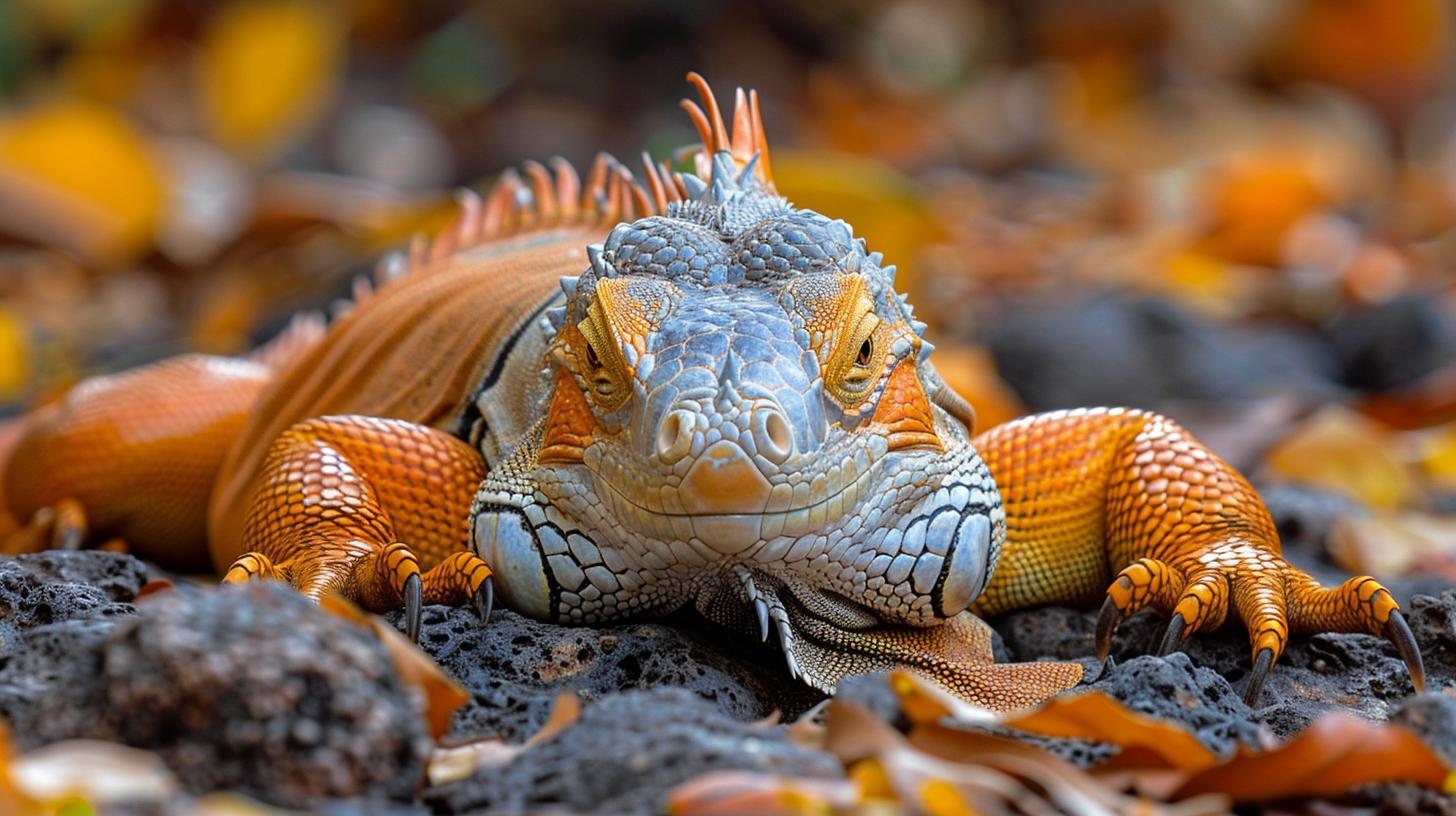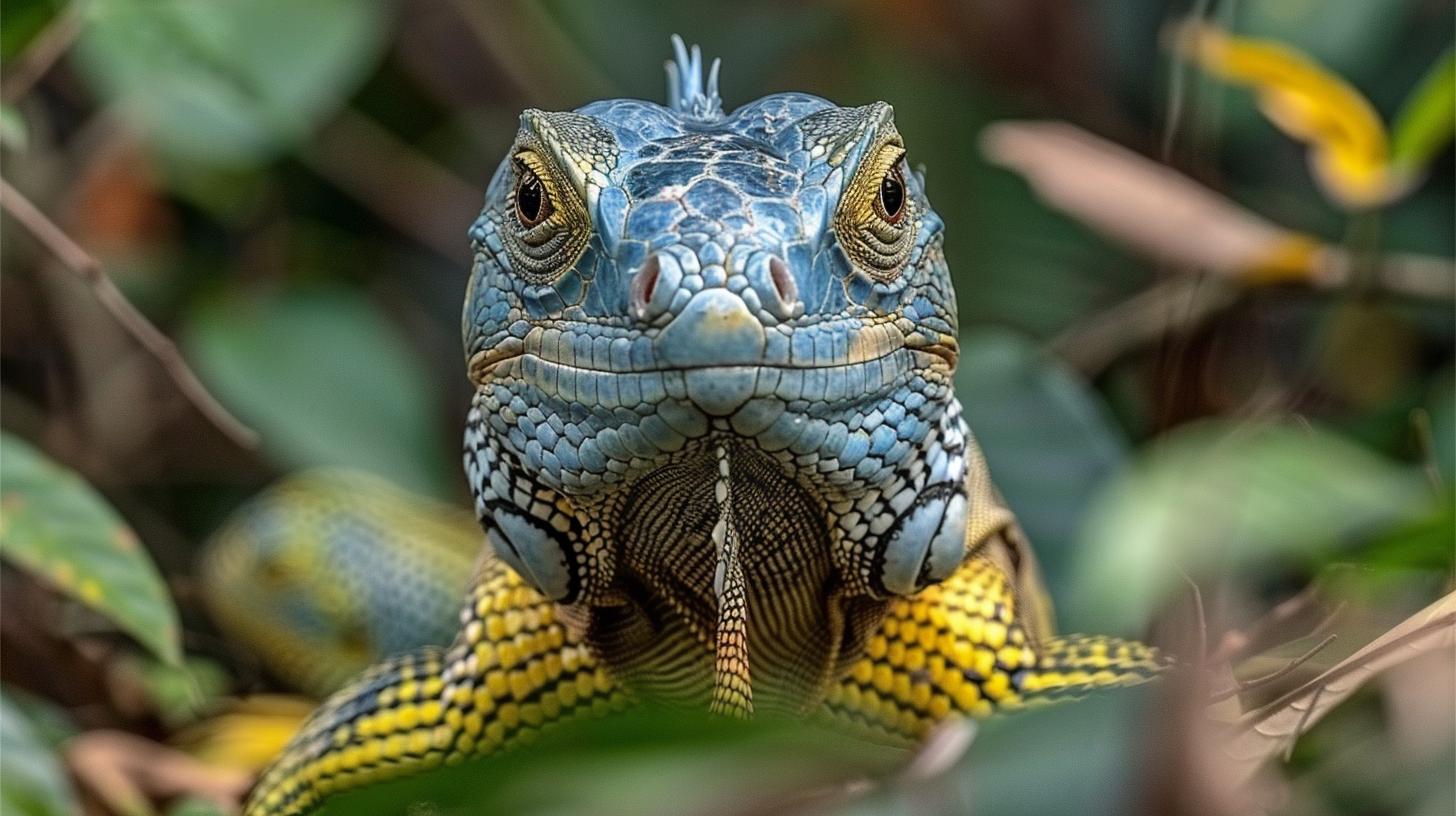Top 10 Iguana-Safe Fruits & Veggies Explained

Introduction to Iguanas and Their Dietary Needs
Understanding an iguana diet is essential for any pet owner aiming to ensure the longevity and health of their scaly companions. Iguanas, with their prehistoric appearance and calm demeanor, have captivated the hearts of many. Yet, their specific nutritional requirements often remain a mystery to those new to their care. Central to these needs is a balanced diet - a crucial element that significantly impacts their overall well-being.
Fruits and vegetables are not just occasional treats but fundamental components of an iguana's dietary regimen. The inclusion of these food items is paramount owing to the plethora of nutritional benefits they offer. Rich in vital vitamins, minerals, and necessary hydration, fruits and veggies cater to the intricate health requirements of iguanas. They play a significant role in bolstering their immune system, ensuring proper digestion, and supporting physiological functions.
Embarking on this exploration into the optimal foods for iguanas opens up a world where proper nutrition meets care. Our focus on detailed lists and guidelines for feeding will act as a blueprint for pet owners dedicated to nurturing their iguanas through thoughtful diet planning. As we delve deeper into identifying which fruits and vegetables best serve these purposes, we align closer with practices that promote longevity and vitality in these exotic pets.
The Role of Fruits and Veggies in an Iguana Diet
Understanding the significant role fruits and veggies play in an iguana diet is pivotal to ensuring the health and longevity of these majestic reptiles. Unlike many other pets that may thrive on a more protein-centric diet, iguanas are primarily herbivorous.
This dietary preference underscores the importance of *fruits and vegetables* not only as occasional treats but as staples for their day-to-day nutritional requirements. The inclusion of these food items provides a broad spectrum of vitamins, minerals, and hydration essential for their well-being.
Fruits and vegetables contribute immensely to the *iguana diet* by offering a balanced mix of nutrients crucial for their growth, immune system, and overall health. For instance, vegetables are rich sources of calcium vital for bone development, while fruits can be excellent hydration sources, containing both water and beneficial sugars. These components support not just physiological health but also aid in digestion and play a part in the vibrant coloring seen in healthy iguanas.
To facilitate understanding, here is a simplified breakdown:
- Vegetables: Critical for providing fiber and minerals like calcium.
- Dark leafy greens: High in Vitamin A which supports vision health.
- Squash: Offers beta-carotene, aiding skin health.
- Fruits: Introduce natural sugars for energy along with hydration.
- Papayas: Loaded with vitamins C and A.
- Figs: Provide dietary fiber and potassium.
However, it's essential to maintain balance within this spectrum. Although fruits offer unique benefits, they should be given in moderation due to their sugar content; excessive sugars can lead to health issues over time. Conversely, a variety of safe vegetables should form the core of an iguana's daily intake. This balance ensures that iguanas receive all the necessary nutrients without any adverse effects from overconsumption of one type over the other.
The narrative around feeding iguanas has evolved significantly with deeper insights into their dietary needs becoming available. It's clear that while variety is key to preventing nutritional deficiencies or excesses; knowledge about each fruit or vegetable's specific benefits allows pet owners to tailor diets more precisely to their pet's needs.
As we progress further into exploring suitable foods, keeping these principles at heart will help guide creating a nourishing iguana diet that promotes thriving green wonders under our care.
Continuing from this foundation on the role fruits and veggies play will lead us effortlessly into detailing some top recommendations for iguana-safe fruits and vegetables. This journey through understanding optimal dietary compositions illuminates pathways toward maintaining vibrant, healthy pets filled with vitality-truly an enriching endeavor for any dedicated pet owner aiming not just for survival but flourishing life spaces for their scales companions.
Top 5 Iguana-Safe Vegetables
Introduction to Iguana-Safe Vegetables
Venturing into the realm of iguana diet specifics, understanding the role of vegetables in their meal plan is paramount. These cold-blooded reptiles require a carefully curated diet to thrive, encompassing a variety of nutrients that mimic their natural intake found in the wild.
Vegetables are not just fillers; they are vital sources of vitamins, minerals, and fiber which play critical roles in maintaining an iguana's health. It's crucial to discern which vegetables are safe and nutrient-rich to include in their daily regimen, ensuring these pets lead a vibrant and lively life under domestic care.
Within this dietary exploration, we'll delve into the top-tier vegetables deemed safe for iguanas. These selections were not made at random; each vegetable listed has undergone scrutiny for its nutritional value, safety, and overall benefit to iguana well-being. Incorporating these veggies into your iguana's diet can help prevent malnutrition and other health issues related to poor dietary habits.
Nutritional Powerhouses for Your Iguana
First on our list comes the humble collard greens, a leafy vegetable laden with calcium-an essential mineral for preventing metabolic bone disease in iguanas. This condition is prevalent among captive iguanas due to insufficient calcium intake or improper UV light exposure necessary for vitamin D synthesis and calcium absorption. Collard greens also provide a healthy dose of Vitamin A, key for maintaining good vision and immune function.
Another commendable inclusion is butternut squash; not only does it offer a nice variation from leafy greens, but it's also packed with beta-carotene (which gets converted into Vitamin A), vitamins C, B6, and significant amounts of dietary fiber aiding digestion-a common concern among iguana owners looking to ensure gut health in their reptilian companions.

Lastly, *turnip greens*, often overshadowed by more commonly known veggies, stand out as an excellent choice for an iguana diet They are rich in nutrients while being low in oxalates compared to other greens-important since high levels can lead to decreased calcium absorption leading potentially towards bone health issues. Furthermore, turnip greens boast ample amounts of vitamins C and E that contribute greatly towards cell protection from oxidative stress along with overall growth promotion.
As we continue exploring other beneficial vegetables suitable for iguana consumption based on their unique dietary needs-like bell peppers noted for high vitamin C content-remember the importance of variety. Introducing different textures and tastes can enhance feeding times making them something your pet looks forward toward regularly while equally contributing positively towards their nutrition and longevity.
Top 5 Iguana-Safe Fruits
Entering the realm of an iguana's dietary needs invites a deep dive into not only their preferences but the nuances of how each type of food supports their health. Iguanas, with their vivid colors and intriguing behaviors, require a meticulously curated diet to thrive in captivity. When it comes to fruits, careful selection is paramount.
These are not just tasty treats for your scaly friend; they are vital sources of hydration and essential vitamins that contribute significantly to an iguana's overall well-being. As we explore this section, our focus will shift towards understanding which fruits safely align with these criteria and how they bolster the health of these fascinating reptiles.
Nutritional Powerhouses
Fruits, rich in vitamins, minerals, and water content, play a crucial role in the iguana diet They serve not merely as occasional indulgences but as fundamental pillars supporting various physiological functions - from digestion to hydration.
However, striking the right balance is key since too much fruit can lead to digestive issues or nutritional imbalances due to high sugar content. Thus, identifying those fruits that provide maximal nutritional benefits without negative side effects is crucial for any iguana owner aiming for optimum pet care.
Must-Have Fruits for Your Iguana
Among the vast array of choices, certain fruits stand out as especially beneficial for iguanas. First on the list is papaya. Not only is it low in sugar compared to other fruits, but it's also packed with vitamins A and C - essential for maintaining good vision and immune function in iguanas. Additionally, its soft texture makes it easy for iguanas to consume and digest.
Mangoes offer another excellent choice; rich in antioxidants and fiber, they help support digestive health while providing a tasty variety to your pet's meal plan. Similarly,figs emerge as superior options, offering calcium necessary for strong bone development along with dietary fiber.
Lastly,blueberries can be incorporated into meals occasionally; known for their antioxidant properties, they aid in preventing cellular damage within your pet's body.
Each selected fruit brings something unique to the table - from critical vitamins and minerals essential for daily function to hydration necessary for overall vitality.
It's vital to remember that while these fruits are safe and healthy options when properly prepared - washing thoroughly to remove any pesticides or cutting them into manageable pieces - moderation remains key. Integrating these fruits into your iguana's diet adds not only nutritional value but also much-needed variety keeping mealtimes interesting and engaging furthers promoting every aspect required in sustaining a balanced diet further enriching your pet's life quality significantly.
Foods to Avoid
Understanding which foods to steer clear of is vital in maintaining a balanced iguana diet. While many fruits and vegetables are beneficial, certain ones can pose significant health risks to your reptile friend. This part of the guide will delve into some commonly mistaken items that should be omitted from an iguana's meal plan to ensure its well-being.
Firstly, it's crucial to avoid feeding iguanas any form of dairy products. As herbivores, iguanas lack the necessary enzymes to digest dairy, making cheese, milk, or yogurt harmful to their digestive system. Similarly, meat and insects, often thought by some as a protein source for pets, are unsuitable for iguanas and can lead to severe health issues such as kidney failure due to the high amounts of animal protein.
In terms of fruits and vegetables that must be avoided or seriously limited in an iguana diet, the following list highlights these potentially harmful items:
- Rhubarb: Contains oxalic acid, which can lead to kidney damage.
- Avocado: The persin content in avocado is toxic to iguanas.
- Onions and Garlic: Both contain compounds that can cause digestive distress and may lead to anemia if consumed in large quantities.
While some fruits like strawberries or raspberries can be part of their diet in moderation due to their sugar content, they should not dominate the iguana diet. Excessive sugar intake can result in obesity and other metabolic diseases in iguanas over time.
As you continue exploring suitable dietary options for your pet iguana, remember that a robust understanding of both recommended foods and those to avoid plays a critical role in caring for your reptile. After highlighting these foods not meant for iguana consumption, our discussion will progress into practical feeding guidelines and tips.
This shift aims at equipping you with actionable insights on how best to integrate healthy fruits and veggies into your pet's diet while avoiding those that could compromise its health. With this approach, we aim not only for diversity but also for a nutrient-rich regimen that resonates with the natural dietary habits of these fascinating creatures.

Feeding Guidelines and Tips
In understanding the best practices for feeding iguanas, it's essential to grasp not only *what* these reptiles eat but also *how* and *when* they should eat. The proper implementation of an iguana diet plays a pivotal role in their overall health and longevity. It's not just about loading their habitat with random fruits and vegetables; it involves careful consideration of portion sizes, frequency, and variety.
| Component | Frequency |
|---|---|
| Leafy Greens | Daily |
| Vegetables | 3-4 times a week |
| Fruits | 2 times a week (as treats) |
Portion size is crucial when creating meals for your iguana. Overfeeding can lead to obesity and related health issues, which are as detrimental in reptiles as they are in humans. An adult iguana's daily vegetable intake should roughly equate to the size of its body excluding the tail.
This guideline helps prevent overfeeding while ensuring they receive enough fiber and nutrients from their vegetables. As for fruits, which are higher in sugar, they should be given sparingly - consider them treats rather than regular dietary staples.
Another key aspect of an iguana diet is variety. Just like humans, iguanas thrive on a mix of different foods which ensures a balanced intake of vitamins and minerals critical for their well-being. Constantly feeding them the same food can not only lead to nutritional deficiencies but may also make them picky eaters over time.
To keep things interesting and nutritious, rotate through the recommended fruits and vegetables mentioned earlier in this article. Experimenting with different combinations can help identify what your pet prefers while giving you peace of mind that they're getting everything they need nutritionally.
It's clear that a thoughtful approach to an iguana's diet goes beyond simply knowing what they can eat - it encompasses how those foods are provided too. Feeding guidelines like these ensure that the pet receives all necessary nutrients without excesses that could harm its health.
Variety encourages healthy eating habits while making mealtime more enjoyable for them. However, integrating these safe fruits and veggies into an iguana's menu is just one step toward optimal care; understanding further needs such as hydration sources and supplement requirements adds another layer to maintaining a thriving habitat for your reptilian companion.
Ensuring Variety and Balance
After journeying through the intricate needs and dietary recommendations for iguanas, we arrive at a critical juncture that intertwines the essence of ensuring variety and balance in their meals. The insight provided on the top 10 iguana-safe fruits and veggies elucidates a fundamental aspect of pet care-nourishment goes beyond mere sustenance; it is about enhancing wellness and vitality.
Reflecting on this rich tapestry of nutritional knowledge, including the pivotal role these foods play in an iguana diet, underscores the importance of mindful feeding practices. These are designed not only to meet the physiological demands but also to cater to the subtle nuances that promote thriving health in these majestic creatures.
Navigating through the selections of vegetables and fruits safe for iguanas reveals a broader narrative: each choice represents a building block towards optimal health, emphasizing vitamins, minerals, hydration, and the sheer joy of varied flavors. Such variety prevents monotony and nutritional deficiencies, showcasing our commitment to providing comprehensive care guides that resonate with both seasoned and budding iguana enthusiasts.
It is a testament to our dedication towards fostering environments where pets can flourish, supported by diets that mirror their natural inclinations and necessities closely.
In closing, as you embark on this rewarding journey of iguana care, remember that every fruit and veggie introduced into your pet's diet carries significance. From bolstering immune systems with vitamin-rich choices to ensuring proper hydration through moisture-laden snacks, your approach to their nutrition shapes their health trajectory profoundly. We invite you to continue your exploration within our curated content library for more insights into pet care excellence.
Dive further into articles that broaden your understanding and expertise, enabling you to cultivate an enriching habitat for your cherished companion. Join us as we navigate this fascinating world together-where learning never ceases, and passion for pet care knows no bounds.
Frequently Asked Questions
What Foods Are Toxic to Iguanas?
Iguanas should never consume foods such as dairy products, meat, eggs, or chocolate. These items can cause significant health issues since iguanas are primarily herbivorous and their digestive systems are not designed to process animal proteins or high-fat items. Additionally, avocados and rhubarb contain toxins harmful to iguanas, so these should also be avoided to maintain their health.
Do Iguanas Eat Rats?
Iguanas do not eat rats. Being herbivores, their diet mainly consists of leaves, flowers, and fruits. In the wild or in captivity, feeding them animal protein like rats can lead to serious health problems including kidney failure and shortened lifespan due to the improper nutritional balance for their species.
Can Iguanas Eat Scrambled Eggs?
Iguanas should not eat scrambled eggs. Their digestive systems are designed for a diet that consists almost entirely of plants. Feeding them eggs or any other form of animal protein can be harmful to their health, potentially leading to kidney damage or other digestive issues over time.
Do Iguanas Eat Rabbits?
Iguanas do not eat rabbits. As strict herbivores, they thrive on a diet rich in vegetables, fruits, and flowers rather than meat or animal products. Introducing meat into an iguana's diet goes against their natural dietary requirements and can result in health issues.
What Do Iguanas Hate?
Iguanas have a strong dislike for certain scents and substances including synthetic perfumes, pesticides, and loud noises which can stress them out significantly. They also tend to avoid water with strong chlorine smells or flavors as it's unsettling for them.
Preferences can vary between individual iguanas but creating a calm environment free from these elements generally helps keep them comfortable.
What Is Iguanas Favorite Food?
An iguana's favorite food often includes leafy greens such as collard greens, mustard greens, and dandelion greens which provide them with necessary nutrients without being too calorie-dense.
They also enjoy fruits like mangoes, papayas, and figs as treats in moderation due to their higher sugar content compared to vegetables but still relish these flavors when offered properly as part of a balanced diet.
Leave a Reply
You must be logged in to post a comment.